Wed 20 Oct 2010
A Remarkable Life
Posted by Clare under Drogheda Ireland, Healthy Food, Japanese in Ireland, Soul searching
1 Comment
It seems in Ireland, grannies play a pretty important role in the lives of their grandchildren. For a lot of my Irish friends, their Granny was an integral part of the household, living with them and their parents and helping with everything from cooking to homework. And for a few of my friends here, especially those who were the first-born son, Granny was more a mother to them than their Mammy. She took them into her home and essentially raised them from infancy to adulthood.
Although I didn’t grow up around my grandmother or Obaachan, as I would call her (that’s Japanese for “grandmother”), I have great memories of the brief period I lived in Japan as a child and of the visits we’ve had over the years. I’ve been thinking a lot about her lately as last Saturday she turned 101 years old. It’s really mind-boggling to think of all she’s experienced in that time: her marriage to my grandfather, which lasted for 73 years until his death; giving birth to five children, two of whom she has outlived; witnessing the transformation of her beloved city of Osaka from a quiet town to a bustling, modern city; leaving her house of 50-something years to move into an elderly-care facility and learning, later, that it had been torn down.
Her home had a very specific smell, a mix of fragrant, ashy incense and musky wood. It was an old-style Japanese house with a tiled roof, an ofuro bathtub and a very rickety, steep staircase that led up to the tatami rooms on the second floor. I recall the time my sister and I stayed when we were about 20 years old. Both of us smoked cigarettes at the time, something we thought we hid from our grandparents (we’d sneak off down the street and take our puffs in some little alleyway, far from the view of her front garden). One night, as my Obaachan got our beds ready in the tatami room, she said, “You can smoke up here. Ojiisan (“grandfather”) hasn’t been up here in over 10 years so he won’t know!” My Ojiisan was too old to climb those steep stairs and had been confined to the downstairs part of the house for some time. We were both shocked at her canniness; somehow she’d found out about our habit (I’m guessing a nosy neighbor) and despite the fact she didn’t approve handled it in her usual accommodating fashion.
Like a lot of grannies do, my Obaachan spoiled my sister and me. Whenever we’d visit, she’d ply us with gifts. I remember she had this cabinet under her staircase where she kept a variety of presents she’d received over the years, many still perfectly placed in boxes or even wrapped in fine oriental paper – all things she’d decided would be better suited for someone other than herself. Within minutes of our arrival she’d be opening that cabinet and pulling out something for my sister and me. We would both try to politely decline the gifts but she was stubborn and insisted we take whatever she gave us. When we accompanied her to the open-air marketplace near her house, my parents would instruct us not to so much as look at anything in fear that my Obaachan would sense our desire for it and insist on purchasing whatever it was we fancied (which she often did!). It wasn’t that she was trying to buy our affection; I think she genuinely took pleasure in giving.
These days she doesn’t do too much; she’s relatively healthy for her age but is in a wheelchair and requires assistance with the basics of daily life. But she’s still pretty sharp and she takes great pleasure in food, something that hasn’t changed one bit all these years. Every day she enjoys her favorites like rice, grilled fish and seaweed and I think mealtime is something she really looks forward to. Last time I saw her I was amazed at how skilled she was at picking up the most slippery pickled cucumber with her shiny, lacquered hashi (chopsticks). It gives me great comfort knowing that, despite the fact that all of her friends are long gone and that we are far away, she still appreciates the little things in life like a good meal.
Cucumber Sunomono
This vinegary cucumber salad is a very popular dish to serve with sushi or even with a simple bowl of rice. You’ll find variations at nearly every Japanese restaurant; sometimes the cucumber is sliced uber thin, sometimes there will be a bit of seaweed mixed in. But I prefer it simple with the cucumber slices a bit thicker for more crunch. Enjoy!
1 English cucumber
2 tablespoons rice vinegar
2 teaspoons caster sugar
1 teaspoon salt
2 teaspoons toasted sesame seeds
To prepare the cucumber: Slice the cucumber lengthwise. Then, using a small spoon, scoop out the seeds. Now slice the cucumber so they are like little half-moons. In a small bowl, combine the rice vinegar, sugar and salt and stir until completely dissolved – about 5 minutes. Add in the cucumber and sesame seeds and stir. Place in an air-tight container and let refrigerate for at least four hours. Serve with a sprinkle of extra sesame seeds on top.

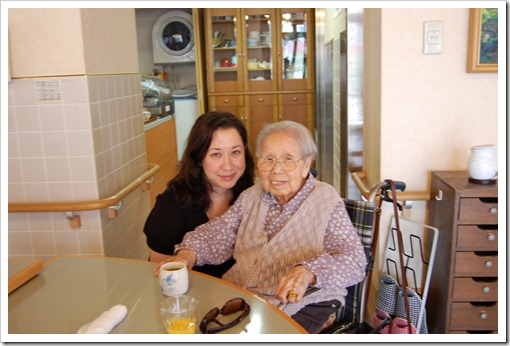
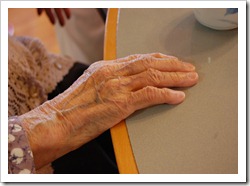
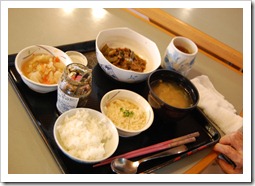
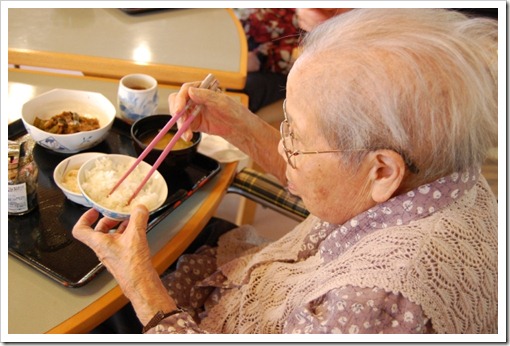
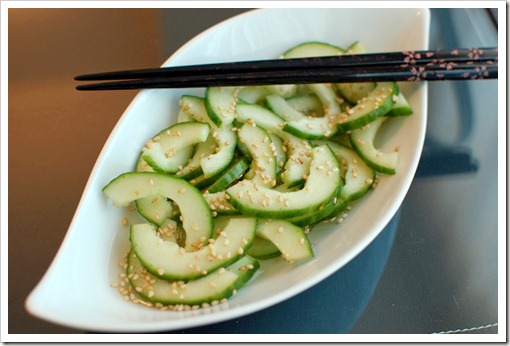


I love hearing stories about your obaachan. What a remarkable woman!